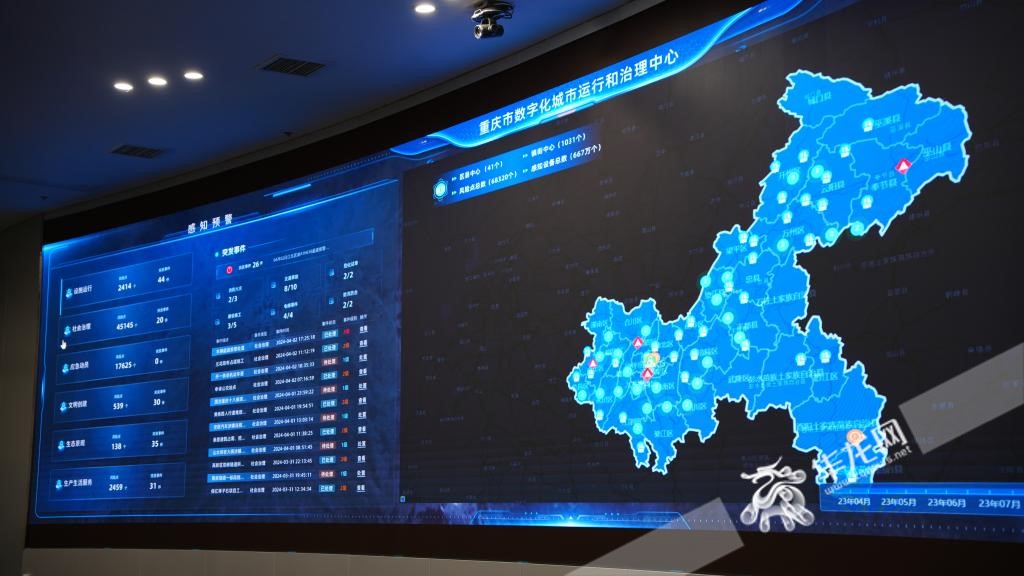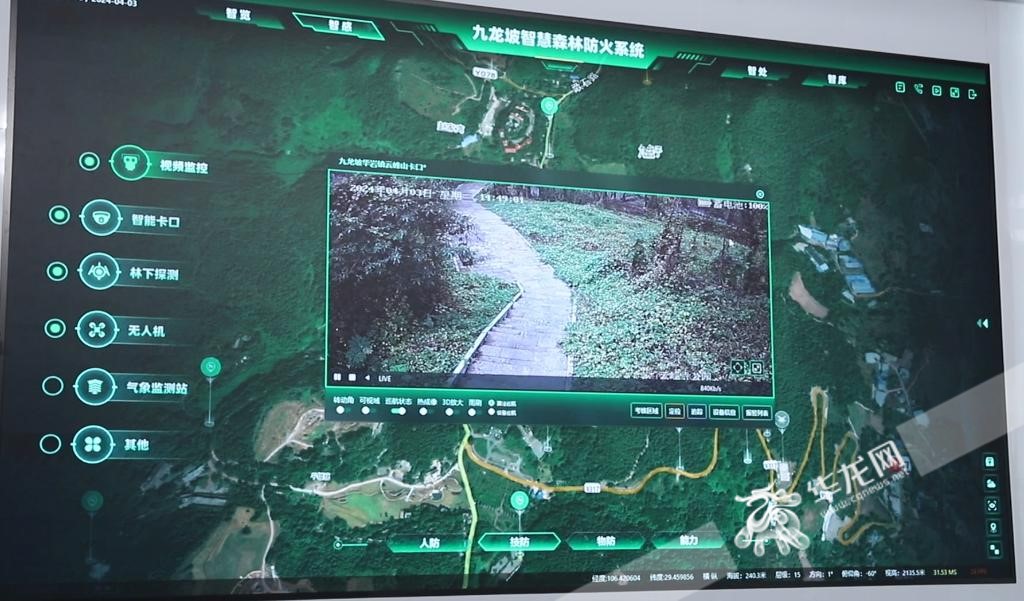Digitalization drive helps advance modernization of social governance in Chongqing
In the office building of the Chongqing Ecology and Environment Bureau, a water monitoring and control system flashed red, signaling excessive phosphorus concentration at a river section.
By tracing data from the sensors network, the system narrowed down the investigation area and pinpointed several upstream industrial enterprises as potential sources of contamination.

Photo shows the digital urban operation and governance center of southwest China's Chongqing municipality. (Photo from cqnews.net)
Inspection teams from local environmental protection agencies and other relevant departments were immediately dispatched to the identified sites. After their intervention, water quality returned to the normal level.
This rapid response was made possible by Chongqing's efforts to advance digitalization.
The water monitoring and control system integrates data from over 10 municipal departments in agriculture, water resources, housing and urban-rural development sectors, as well as districts and counties in Chongqing.
The system's sensing network has expanded from the original 1,112 sensors to over 15,000, allowing issues to be detected within 24 hours on average, down from 7 days previously.
In April 2023, Chongqing initiated a comprehensive digital transformation program known as "Digital Chongqing." This involved establishing an integrated intelligent public data platform, a three-tier digital urban operation and governance center, six major application systems, and an intelligent governance framework.

Staff members work at the digital urban operation and governance center of Jiulongpo district, southwest China's Chongqing municipality. (Photo from cqnews.net)
The program aimed at infusing digital technologies and digital cognition into every aspect of city management and service delivery, restructuring operational systems, business processes and institutional mechanisms across various sectors, and modernizing social governance.
Recently, the digital urban operation and governance center in Chongqing's Jiulongpo district received an alert: a dump truck with unsecured load was identified by video surveillance while crossing into another district's jurisdiction in violation of regulations.
Through a location tracking system, the vehicle's position and originating construction site were quickly pinpointed. With a single click, a task order was dispatched to relevant authorities. The detection to resolution of the entire illegal dump truck incident took less than 3 hours.
In advancing digitalization, Chongqing has worked to break down information barriers between government departments.
"Based on the data collected from government departments related to housing, urban management and transportation, we developed a dump truck monitoring system, which had been promoted city-wide to solve monitoring challenges," said Zhang Jun, deputy director of Jiulongpo district's big data application and development management bureau.

Photo shows an intelligent forest fire prevention system in Jiulongpo district, southwest China's Chongqing municipality. (Photo from cqnews.net)
Chongqing also pursues targeted governance while promoting digitalization. For instance, the Xianglushan neighborhood of Chongqing High-tech Industrial Development Zone installed smart door sensors for elderly residents living alone and connected them to its governance command center. In Baochengsi community of Changzhou neighborhood, Rongchang district, an intelligent elderly care system is in place to serve senior citizens in need.
Over 1,000 townships and neighborhoods in Chongqing have established the integrated three-tier digital governance network, which seamlessly connects the township and neighborhood level, the village and community level, and finally down to individual grid unit areas.
Chongqing has made 65,000 digital grid-level holographic maps that facilitate end-to-end task allocation and case management. As a result, the resolution rate for issues reported at the grid level has reached 99.9 percent.
Digitalization has made public services more efficient. To better address public concerns, the Chongqing Municipal Public Security Bureau launched an online service platform. The platform offers over 430 online services, and over 80 percent of them need no offline procedures at all. Since the platform was launched in January 2021, it has processed over 100 million service requests.
Since April 2023, Chongqing rolled out 75 "one-stop" service packages citywide, covering high-frequency domains and key services closely related to production and daily lives of businesses and citizens, such as one-stop business registration and one-stop birth registration.
Photos
Related Stories
- China (Chongqing) Pilot Free Trade Zone supports Chongqing in building hub for inland opening-up
- Letter from China: Breathing new life into old neighborhood
- SW China’s Chongqing steps up efforts to crackdown on intentional spreading of HIV/AIDS
- City view of China's Chongqing Municipality
- Chengdu-Chongqing: new highlight of opening up in western China
Copyright © 2024 People's Daily Online. All Rights Reserved.









